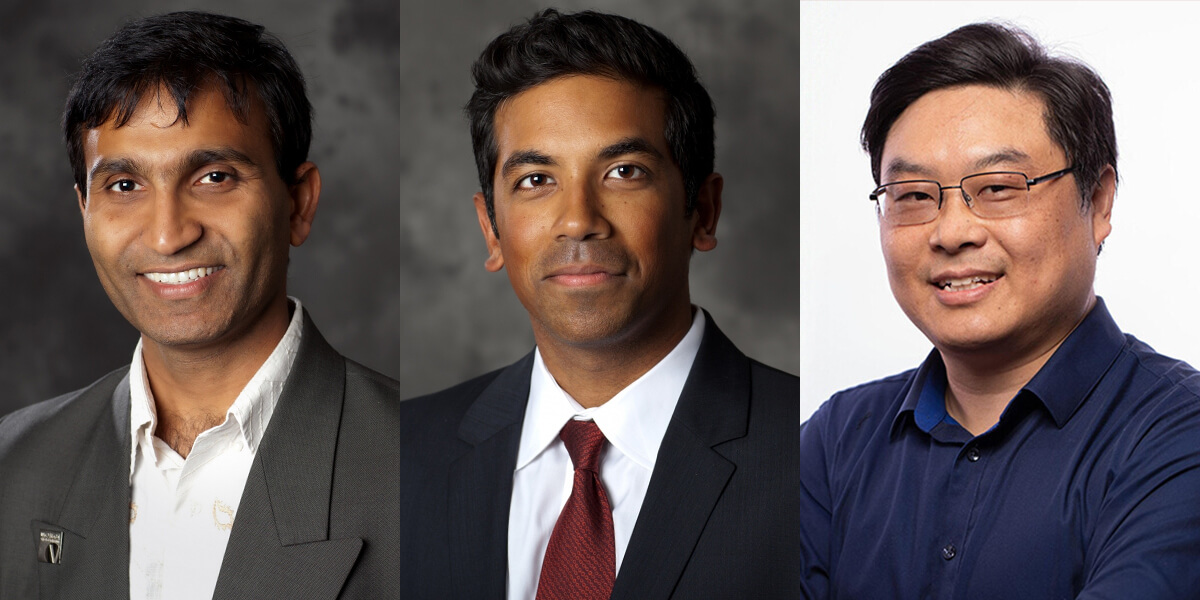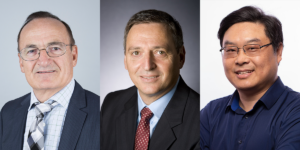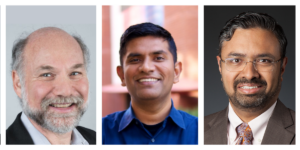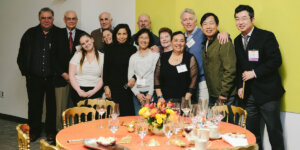
Murali Annavaram (left), Krishna Nayak, and Joshua Yang were elevated to IEEE Fellows.
Murali Annavaram
Annavaram is recognized “for contributions to heterogenous architectures for energy-efficient computing systems.” His research focuses on energy efficiency through heterogeneous computing, high performance computing reliability, hardware-assisted secure and private machine learning, and building innovative sensor data collection platforms to improve human performance.
Last year, Annavaram was named the inaugural director of the USC-META Center for Research and Education in AI Learning. The center supports a variety of activities, including open-source AI research and graduate scholarships. In his role as director, Annavaram is responsible for enhancing curricula and opportunities within the ECE department while working to help train a new generation of students to better understand the technical and societal impacts of AI-related research.
Annavaram received his MS degree in computer science from Colorado State University and his PhD in computer engineering from the University of Michigan. In addition to his recent elevation to IEEE Fellow, he holds an NSF CAREER Award, is a senior member of the Association for Computing Machinery (ACM), and is the winner of an IBM Faculty Partnership award.
Krishna Nayak
Nayak is recognized “for contributions to real-time magnetic resonance imaging of the human heart and vocal tract airway.” His lab, the Magnetic Resonance Engineering Laboratory, is at the forefront of MRI imaging. Nayak was instrumental in helping to bring an ultra-rare low field MRI Machine to USC Viterbi. Housed in the Michelson Center for Convergent Bioscience and managed by Nayak and the Dynamic Imaging Science Center (DISC), the machine is one of only three of its kind in the world. With it, Nayak and his colleagues can perform tests unavailable to most researchers.
To date, his contributions have included new MRI pulse sequence designs, data sampling and image reconstruction techniques, and artifact mitigation techniques. Nayak has a diverse portfolio of projects that currently includes new tools for cardiac stress testing, obstructive sleep apnea assessment, brain tumor evaluation, and the study of normal and abnormal speech production.
Nayak received BS degrees in electrical engineering, computer science, and applied mathematics from Florida State University, and MS and PhD degrees in electrical engineering from Stanford University. Along with his new IEEE rank of fellow, he is also a fellow of the Society for Cardiovascular Magnetic Resonance (SCMR) and the American Institute for Medical and Biological Engineering (AIMBE).
Joshua Yang
Joshua Yang is recognized for “contributions to resistive switching materials in memory and neuromorphic computing.” Yang joined the Ming Hsieh Department of Electrical and Computer Engineering in the Fall of 2020. Prior to that, he was a professor of the ECE department at the University of Massachusetts Amherst between 2015 and 2020. He also spent 8 years at HP Labs between 2007 and 2015, leading an emerging materials and devices team for memory and computing.
Yang’s current research interest is Post-CMOS hardware for neuromorphic computing, machine learning and artificial intelligence. He holds 118 granted and about 60 pending US Patents, among which two patents on MRAM were licensed by a world leading semiconductor company, the patents on RRAM were transferred to memory manufacturers and national Labs for product development, and the patents on neuromorphic computing led to a fast-growing startup company recently.
Yang received his BS degree in electrical engineering from Southeast University and his MS and PhD degrees from the University of Wisconsin, Madison. He is the Founder Chair of the IEEE Neuromorphic Computing Technical Committee, a recipient of the Powell Faculty Research Award, and a recipient of UMass distinguished faculty lecturer and UMass Chancellor’s Medal, the highest honor of UMass. He was named as a Spotlight Scholar of UMass Amherst in 2017. He is a Clarivate™ Highly Cited Researcher in the field of Cross-Field.
Published on February 10th, 2022
Last updated on February 14th, 2022













